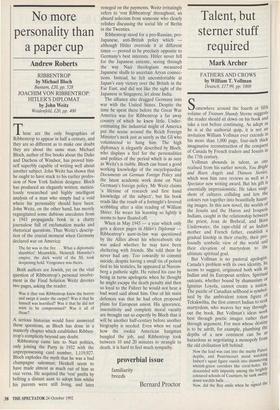No more personality than a paper cup
Andrew Roberts
RIBBENTROP by Michael Bloch Bantam, £20, pp. 528 JOACHIM VON RIBBENTROP: HITLER'S DIPLOMAT by John Weitz Weidenfeld, 120, pp. 400 These are the only biographies of Ribbentrop to appear in half a century, and they are so different as to make one doubt they are about the same man. Michael Bloch, author of five books about the Duke and Duchess of Windsor, has proved him- self superbly capable of writing well about another subject. John Weitz has shown that he ought to have stuck to his earlier profes- sion of New York fashion designer. Bloch has produced an elegantly written, meticu- lously researched and highly intelligent analysis of a man who simply had a void where his personality should have been. John Weitz, on the other hand, has merely regurgitated some dubious anecdotes from a 1943 propaganda book in a chatty journalese full of exclamation marks and rhetorical questions. Thus Weitz's descrip- tion of the crucial moment when Germany declared war on America:
The fat was in the fire ... What a diplomatic shambles! Meanwhile, Heinrich Himmler's empire, the dark world of the SS, took deepening hold. Vengeance was theirs.
Both authors are Jewish, yet on the vital question of Ribbentrop's personal involve- ment in the Final Solution Weitz devotes two pages, asking the reader:
Was it that von Ribbentrop knew the horror and swept it under the carpet? Was it that he himself was horrified? Was it that he did not want to be compromised? Was it all of those?
A serious historian would have answered these questions, as Bloch has done in a masterly chapter which establishes Ribben- trop's complicity beyond any doubt. Ribbentrop came late to Nazi politics, only joining the Party in 1932 with the unprepossessing card number, 1,119,927. Bloch explodes the myth that he was a bad champagne salesman; Henke11 seem to have made almost as much out of him as vice versa. He acquired the 'von' prefix by bribing a distant aunt to adopt him whilst his parents were still living, and later reneged on the payments. Weitz irritatingly refers to 'von Ribbentrop' throughout, an absurd solecism from someone who clearly relishes discussing the social life of Berlin in the Twenties.
Ribbentrop stood for a pro-Russian, pro- Japanese, anti-British policy which — although Hitler overrode it at different times — proved to be precisely opposite to Germany's best interests. Hitler never fell for the Japanese entente, seeing through the way Nazi theologians measured Japanese skulls to ascertain Aryan connec- tions. Instead, he felt uncomfortable at Japan's easy victory over the British in the Far East, and did not like the sight of the Japanese in Singapore, let alone India.
The alliance also dragged Germany into war with the United States. Despite the time he spent there before the Great War America was for Ribbentrop a far away country of which he knew little. Under- estimating the industrial might of America put the noose around the Reich Foreign Minister's neck just as surely as the GI who volunteered to hang him. The high diplomacy is elegantly described by Bloch, who displays a feel for the personalities and politics of the period which is as sure as Weitz's is risible. Bloch can boast a good working knowledge of the encyclopaediac Documents on German Foreign Policy and the latest academic work done on Nazi Germany's foreign policy. Mr Weitz claims 'a lifetime of research and first hand knowledge of the subject', but his book reads like the result of a fortnight's fevered scribbling after a slim reading of William Shirer. He wears his learning so lightly it seems to have floated off.
When in May 1945 — a year which only gets a dozen pages in Hitler's Diplomat — Ribbentrop's aunt-in-law was questioned by the Allies about his whereabouts she was asked whether he may have been sheltering with friends. She told them he never had any. Too cowardly to commit suicide, despite having a small tin of poison tied to his testicles, he appeared at Nurem- berg a pathetic sight. He ruined his case by being in turns apologetic when he thought he might escape the death penalty and then so loyal to the Ffihrer he would not hear a bad word said about him. One of his main defences was that he had often proposed plans for European union. His ignorance, insensitivity and complete moral vacuity are brought out so expertly by Bloch that it will be another half-century before another biography is needed. Even when we read how the rookie American hangman bungled the job, and Ribbentrop took between 10 and 20 minutes to strangle to death, it is hard to feel much sympathy.
proverbial issue
familiarity breeds
Bernard Proctor


































































 Previous page
Previous page